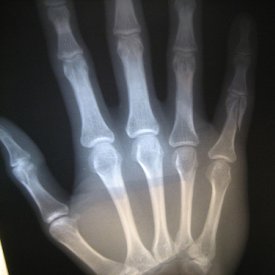How Nutrition Affects Bones
Jan 22nd, 2013
 Osteoporosis is a medical condition in which the quality and density of the bones are reduced. As bones become more brittle and fragile, the risk of fracture is greatly increased. Related fractures commonly happen in the hip, wrist and spine. Osteoporosis can occur in both men and women and at any age, but is most common in older women. According to the U.S. Department of Health and Human Resources, from 2005 to 2008, an estimated 6.3 million Americans aged 65 years and older had osteoporosis, almost 90 percent of them are women.
Osteoporosis is a medical condition in which the quality and density of the bones are reduced. As bones become more brittle and fragile, the risk of fracture is greatly increased. Related fractures commonly happen in the hip, wrist and spine. Osteoporosis can occur in both men and women and at any age, but is most common in older women. According to the U.S. Department of Health and Human Resources, from 2005 to 2008, an estimated 6.3 million Americans aged 65 years and older had osteoporosis, almost 90 percent of them are women.
Nutrition Affects Bones in different ways. There are at least three more nutrients involved in the process: animal protein, salt and vitamin D. Salt increases obligatory calcium loss in the urine so as animal protein, thus making them negative risk factors. “The salt content of the typical American diet is one of the reasons why calcium requirements are so high,” says Linda K. Massey, PhD, RD, a professor of human nutrition at Washington State University in Spokane. Salt intake and blood pressure are strongly linked, and it is also believed that patients with high blood pressure excrete more calcium in the urine and are, therefore, at higher risk of osteoporosis.
“Eating a lot of meat could accelerate bone density loss in postmenopausal women, while sticking with more common protein amounts, primarily from plant and dairy sources did not. The acidity that is associated with foods containing amino acids such as meat may promote the loss of calcium,” says Massey. “And the way our kidneys handle that acid can influence calcium regulation.”
What nutrients should you be getting to help fight bone loss? The most important are calcium and vitamin D. It is known that calcium is essential in building strong bones and reducing fracture risks. A lifelong lack of calcium plays a major role in the development of osteoporosis. Vitamin D is the key component for optimal calcium absorption by the body. The two come hand in hand, if you don’t get enough calcium, there’s nothing for the vitamin D to help your bones absorb and both should be part of any osteoporosis treatment. Experts think that vitamin D may do more to protect you from osteoporosis than only helping you absorb calcium. A recent study suggests, if you get enough vitamin D, you not only improve your calcium, but you’re less likely to fall and get a fracture.
You can get calcium and vitamin D from supplement but it’s best to get these nutrients from the food you eat. “Study after study has shown that people aren’t very good at taking supplements regularly,” says Robert Heaney, MD, FACP, a professor of medicine at Creighton University in Omaha, Nebraska. “But eating is something you do every day, so it’s easier to make a habit of dairy consumption.” In addition to milk, there is a variety of food that contains calcium. Some of them include: dairy products, broccoli, spinach, oranges, fish and beans. It is always important to read food labels, choose those such as ”calcium-rich” or ”excellent source of calcium.” On the other hand, you may want to take Vitamin D supplements for it is a little hard to find in your daily food consumption because it only occurs in only few foods like egg yolk, liver, salmon and sardines. Few other foods are sometimes vitamin D fortified like cereals and milk. Your body can naturally produce vitamin D through sun exposure. The safest strategy is including enough calcium and vitamin D in your food, and supplement if necessary and be sure to limit salt and animal protein intake. Talk to your health care provider on how to maintain a balance of these nutrients that will help you avoid osteoporosis.
Source: VISTA Health Solutions
Related posts from our blog:
No related posts.
Tags: Nutrition Affects Bones
Posted in: Simon Bukai | Comments Off